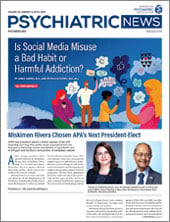Working in psychiatry exposes you to the extremes of the human condition: rage, shame, panic, fear, melancholy, and grief. Part of our role as psychiatrists is to sit with our patients through these intense feelings and create a space in which they are allowed to explore these parts of themselves while feeling safe and heard. We regularly help patients develop curiosity about a wide range of affects, identify their feelings, and understand themselves better. Although this work can be incredibly rewarding, it is important to remember that being a consistent, calm, safe, and thoughtful clinician takes a significant amount of mental and emotional energy. For mental health professionals to function well and create a holding space for our patients’ intense emotions, it is paramount that we have access to psychiatric care. The benefits that we provide to our patients are the same ones we sometimes desperately need to receive in order to continue doing our essential work.
In addition to this, it is crucial to understand that being a resident physician is itself a risk factor for depression. Residency requirements create conditions that normalize poor work-life balance and sleep deprivation, both of which negatively impact mental health. Additionally, social isolation is commonplace as residents’ waking hours are consumed by working. More than 1 in 4 residents report suffering with depression, which is significantly higher than average when compared with the rates of the general population, according to a
2015 report in
JAMA. Furthermore, being a resident shortens one’s telomeres, the protective structure at the ends of chromosomes. According to a
2019 study in
Biological Psychiatry, a resident’s DNA during the intern year ages six times faster than that of the average person.
Working as a resident has very real emotional and physical consequences. After accidents, suicide is the number one cause of death for residents. According to a
2015 study in
JAMA Psychiatry, as many as 22% of interns had suicidal thoughts, and only about half of these thoughts were adequately addressed with psychotherapy. The suicide rate among male physicians is 1.41 times higher than the general male population. And among female physicians, the rate is even higher—2.27 times greater than the general female population, according to a
meta-analysis in
The American Journal of Psychiatry. We need to prioritize the mental health of residents and encourage them to get treatment, as untreated mood disorders are a risk factor for suicide.
Even though psychiatrists report having less clinical work demands, they report higher work-related emotional exhaustion and severe depression than other physicians. One explanation for this is that psychiatrists are exposed to occupational hazards that worsen burnout. For example, one concern in mental health treatment is violence perpetrated by patients. Another unfortunate reality is that psychiatry residents may have patients who die by suicide, which can be a particularly destabilizing aspect of the job. The last few years have been even more challenging than usual. A
2023 paper in
Psychiatric Research reported individuals who were infected with COVID-19 (importantly, many resident physicians acquired COVID-19 at some point during the pandemic) demonstrated a 200% increased rate in suicide attempts. On top of this baseline increase of suicidal thoughts, stressors at the height of the pandemic affected psychiatry residents as well, with about
half reporting symptoms of depression and anxiety.
Unfortunately, health institutions across the nation are cutting department funding, including taking away funding for psychiatric services for residents. This means that the care that was previously paid for by the hospital system was disrupted because many resident doctors, who live paycheck to paycheck, cannot afford this extra expense.
This is a call for every psychiatry residency program to provide free psychiatric services for their residents and create a culture where seeking care is supported. The decision not to cover these services for psychiatry residents is a dangerous one. ■
The author thanks Cadence Trapini, M.D., for her contributions to this article. Trapini is a third-year psychiatry resident at Rush University.

